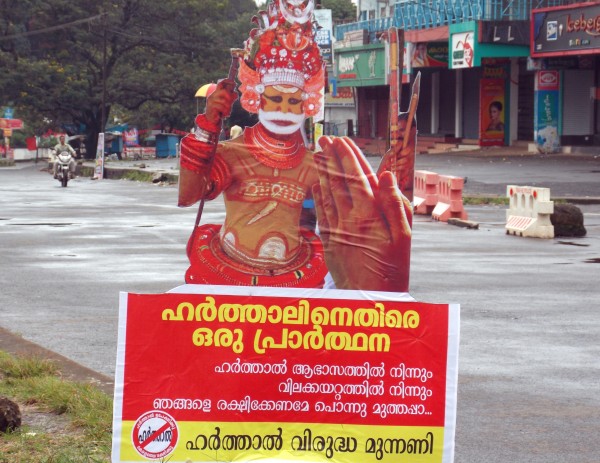Hartals – strikes – have clearly become a way of life in Kerala which has seen as many as 363 of them, called by different political parties, since 2005. There have been 18 hartals so far this year alone. While hartals are called for various reasons, political, economic and social, they don’t really achieve what the organisers set out to.
Report by Byju Chalad
Haridas, president of ‘The Proper Channel’, an NGO in Kochi, says calling of hartals by political parties is a violation of the nine guidelines issued by the high court
Here are some facts to demonstrate why calling a hartal to set right a grievance is such a stale idea.
The centre raised the price of diesel to record levels just three months after two hartals were staged in protest against the record hike in petrol prices.
Liquor sales in Beverages Corporation outlets on the day before a hartal shoot up by an average of Rs 3 crore.
In 2005, BMW officials turned their back on Kerala after the two attempts made by its top officials to meet the chief minister happened on hartal days.
A Labour Department study in 2010 had revealed that nearly 95 percent of those in the unorganised sector – fish workers, construction workers, daily wagers of all kinds – are deprived of a day’s work and wages as a result of a hartal.
These facts expose hartals for what they are: One, the authorities have grown immune to them. Two, the general public consider them as a public holiday. Three, they scare investments away. Four, they are harshest on the poor.
“It is convenient for both the political party and the public. Even if an insignificant party calls for a hartal, people are only too willing to oblige,” he said. Shashi Tharoor, MP, the most vocal critic of hartals, wants the practice to be banned.
“The single largest negative factor preventing Kerala growth and investment is our hartal culture,” he said.
Hartal Virudha Munnani, an anti hartal organisation – an action front of Humanist Movement put up a hoarding in the form of a prayer to Muthappan, an local ethnic god, to save the state from hartals.
additional note
If you happen to visit Kerala and find men — young and old, educated and uneducated, blue and white collared — lined up in military discipline in front of a store that fills the state’s coffers (read Kerala State Beverages Corporation), you should guess it is ‘hartal’ the next day; not just that, women and children throng the towns to rent pirated CDs to watch favourite movies, and mobile inbox would be flooded with happy hartal messages. These are the harbingers of a
hartal day.
Every hartal day creates a huge loss for enterprises like the Cochin Shipyard, Techno Parks, KSRTC, etc. Hence, Kerala remains a non-investment friendly State with minimal job opportunities, and most 20+ Keralites do not work in the State simply because there is no work
there.
The next day to the “Emerging Kerala – an investment drive meeting ” that hopes for a 40,000 crore investment and employment opportunity we-keralites faced today a one more harthal that makes the entire state still and people roped to their homes.
The Hartal Virudha Munnani (anti-hartal front) activists displayed anti-hartal cut-outs, mocking the protest as a political gimmick which would not help to lower the prices of essential commodities or diesel price.
Mr. Chandra Babu said the people in Kerala knew well that hartals only caused hardship to people, and served the cause of political parties alone. Hartals do not resolve problems, but instead dissuade people from productive work. Even expatriate Keralites were reluctant to
invest in Kerala out of fear of hartals.










